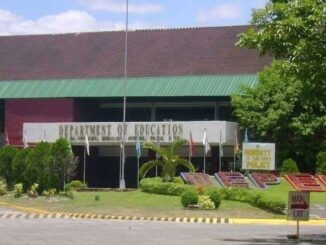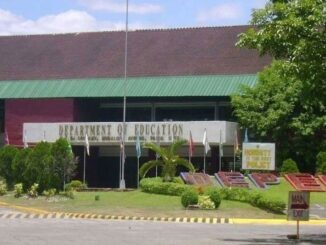
MANILA, Philippines — The Department of Education has formalized the creation of new teaching positions to address bottlenecks in promoting public school teachers, finally implementing an executive order issued in 2022 that introduced the expanded career progression system.
DepEd Secretary Sonny Angara on Friday led the signing ceremony for the issuance of the implementing rules and regulations (IRR) of Executive Order (EO) 174 — a move teacher groups say is long awaited after funding issues delayed the IRR for two years.
Department of Education/Released
EO 174 expands DepEd’s teaching ranks beyond the current Teacher I, II, and III and adds three new positions up to Teacher VII. It also creates new positions for Master Teacher V and streamlines the positions of School Principal I to IV.
The 2022 order also allows public school teachers to pursue either a teaching or administrative track as they get higher positions, which was previously only limited to administrative roles.
Angara earlier vowed to address the slow promotion of public school teachers after President Ferdinand Marcos Jr. said that the government has now allotted enough funds to implement the career progression system in his third State of the Nation Address.
The newly installed Education secretary said that teachers “get pirated for better opportunities because it takes some time for them to be promoted.”
“This one gives them something to look forward to a career track… It’s something which will encourage and incentivize our teachers,” he said.
Angara on Friday said the DepEd is also working on reinforcing its reclassification process to ensure teachers are promoted based on merit and competency instead of vacancies.
DepEd will also coordinate with the Civil Service Commission (CSC) and the Professional Regulation Commission (PRC) to standardize qualifications for teaching positions across all levels of basic education, including senior high school.
EO 174, which was signed June 23, 2022 under then-President Rodrigo Duterte, mandated DepEd, PRC, CSC and the Department of Budget and Management to jointly formulate and issue its IRR by September of that year.
Better late than never?
In separate statements, teacher groups Teachers Dignity Coalition (TDC) and Alliance of Concerned Teachers (ACT) both noted the two-year delay in the issuance of the IRR.
Before this, public school teachers have long waited for an effective promotion system that will not ease them out of the classroom as they go up the ranks, both teacher groups said.
“A meaningful and progressive promotions system has been the decades-old demand of public school teachers who were constrained in three low-salary-level teaching positions despite many years of experience and training due to lack of available items for promotion to higher positions,” ACT spokesperson Roel Mape said.
Mape urged DepEd, CSC and the PRC to work closely with teachers’ unions in drafting the qualification standards for the new teaching items “so that these will be grounded on the current realities of the teachers who perform excessive work load despite meagre salaries.”
Both TDC and ACT also said the IRR should not be used as an “alternative” to raising teachers’ entry-level salary.
Currently, Teacher I positions, the entry-level for public school teachers, is assigned a salary grade of 11 or P27,000 monthly.
ACT reiterated its call for entry-level wages for teachers to be raised to P50,000 to incentivize the “brightest of our youth to become teachers” — a proposal that Angara had earlier thumbed down due to its overall cost to the national budget.
The Second Congressional Commission on Education (EDCOM 2), a three year body tasked to find solutions to the learning crisis, said that restrictions in the career progression of public school teachers are due to the scarcity of plantilla positions and the limitations posed by the existing quota system.
This stunts teachers’ professional growth and mobility within the education system, EDCOM 2 said in its Year One report.





Be the first to comment